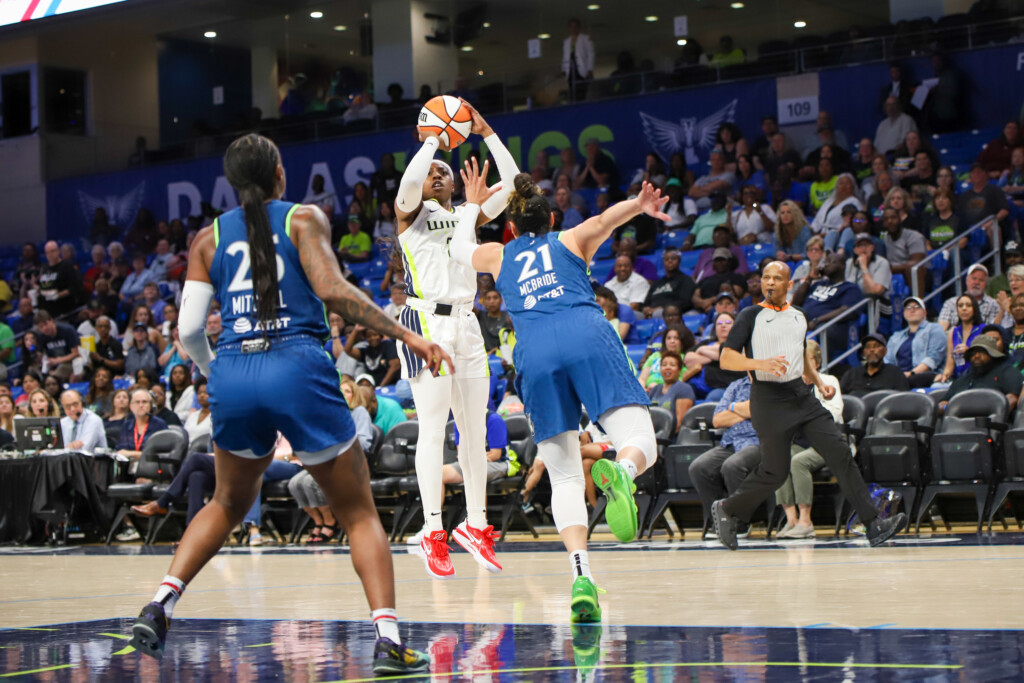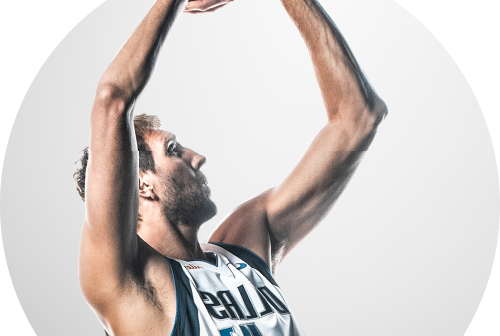After a strong start to the 2023 campaign, the Wings are treading in deep water. They were swept by the new-look Sparks over the weekend, and they had lost five of their last six and seven of their last 10 prior to winning at hapless Phoenix on Tuesday night,. That’s hard to fathom for a team that’s third in the WNBA in points per game and first in rebounding and free throws per game. But 15 games into the season, a couple of major issues have emerged.
The first involves Arike Ogunbowale, the star around whom this team is built. A cursory look at the numbers doesn’t raise an alarm. Ogunbowale, who over the weekend was named an All-Star Game starter, is the league’s third-leading scorer, averaging 22.4 points per game. She has scored 20 or more points in nine games and has cracked double figures in all but one game. This is what you expect from Ogunbowale: points, points, and more points.
Amid all those points, however, are some glaring issues. Dallas is 5-2 when Ogunbowale shoots more than 40 percent from the field and 2-6 when she shoots under 40 percent. Case in point: Sunday’s 10-point loss to the Sparks. Ogunbowale hit 6 of 18 shots from the field, including 1 of 9 from beyond the arc. Nine times this season she has hoisted at least 20 shots, but in only three of those games has she scored in double figures.
Among the 142 players who are averaging at least 20 minutes a game, Ogunbowale is first in field goal attempts and three-point attempts per game, is sixth in usage rate, and is 10th in percentage of team points. But she’s also 88th in field goal percentage, 65th in three-point percentage, and 3rd in unassisted three-point percentage. Those are hardly the kind of numbers you expect from a player who is without question the focal point of the offense.
This is another way of saying that for all of the points the Wings are scoring, the offense is highly inefficient. The ball gets stuck when it moves to Ogunbowale, and she often makes a couple of moves before pulling up from deep. Of the 139 players who have logged at least 280 minutes, Ogunbowale is 106th in percentage of two-pointers attempted.
That is another layer of this issue. The team general manager Greg Bibb and first-year coach Latricia Trammell have built isn’t designed for this style of offense. It’s more positioned to feed Natasha Howard and Teaira McCowan down low, causing defenses to sag inside while opening the floor for Dallas’ shooters. Instead the offense turns molasses slow, the ball stops moving, and missed three-point attempts along with the long rebounds that follow leaves the Wings too often having to defend in transition. That can wear down a team. In fact, in each of their last three losses, the Wings took a lead into the fourth quarter. On Sunday, they were outscored 22-10 in the final 10 minutes.
If you’re hoping for a sudden change in mindset, don’t hold your breath. After Ogunbowale made 1 of 7 shots in the fourth quarter of Sunday’s loss, the Shorthorn’s Isaac Appelt asked her about shooting down the stretch. “I think people are shooting and my coach knows, my team knows, I’m going to shoot when I’m open, and I’m going to make the right decision,” Ogunwobowale said.
Even if she pulls back on the throttle, the other problem is the roster is threadbare. Seven Wings are averaging at least 20 minutes per game. The other four are at eight minutes or less. Dallas needs at least two more players to ratchet up their workloads to have any hope of a sustainable rotation.
This leads back to a well-beaten dead horse: the franchise’s drafting woes. I addressed it after the acquisitions of Howard and Diamond DeShields, whose absence after knee surgery is exacerbating this problem. The Wings, who went into the draft with three first-round selections, had to do the draft right in order for this team to work, and the early returns aren’t promising.
Dallas has two rookies on its roster: Maddy Siegrist, the third overall pick; and Ashley Joens, who went 19th. Lou Lopez Senechal, the fifth selection, underwent knee surgery, and her return is unknown. The Wings also acquired Stephanie Soares, who was taken fourth, but she was already rehabbing an ACL tear that will sideline her until next season. Abby Meyers, drafted 11th, didn’t make it out of camp.
Siegrist, who led the country in scoring during her senior season at Villanova with 29.2 points a game, is averaging 3.0 points and playing just 7.8 minutes a game. Joens has appeared in only eight games, scoring two points in 14 minutes. Eyebrows were raised when the Wings passed over Stanford guard Haley Jones in the draft, and I will never come down from my stance that Dallas should have taken her with the third or fifth pick. While her production is also modest (a little over 5 points plus 3 rebounds and 3 assists per game for a 5-7 Atlanta team), she’s already averaging 22 minutes a night as a key rotation cog.
It would be easy to surmise that things would be different if the Wings had gone another direction in the draft. But based on what we’ve seen, who’s to say that Jones would be getting those 22 minutes a game in Dallas? Second-year point guard Veronica Burton filled in admirably and earned praise from Trammell while Crystal Dangerfield was sidelined with a knee injury, starting the first 11 games. But in Burton’s first three games as a backup, her minutes plummeted from 15 to 11 to 4. (She played 17 minutes against Phoenix, scoring 3 points.)
It’s not just about the rookies. Second-year player Jasmine Dickey and Awak Kuier, who is in her third year, aren’t contributing much, either. DeShields’ absence can’t be overlooked—she averaged 13.1 points per game for Phoenix last season—but until she returns, the Wings need others to step up. If nothing else, Dallas isn’t waiting around for the issue to resolve itself; on Wednesday, Dallas waived Dickey and Joens while bringing back Irving native Odyssey Sims, who averaged 5.8 assists in four games on a hardship contract while Dangerfield nursed an ankle injury.
Then there’s Trammell. Might the Wings be struggling because their first-time WNBA head coach is learning on the job in the world’s most challenging women’s basketball league? At the very least, she doesn’t seem inclined to rein in Ogunbowale, either, deflecting an inquiry from Appelt about her star player’s inefficiency by instead pointing back to her robust scoring average and pointing out that Ogunbowale also led Dallas in assists during the loss.
The season has not yet reached the halfway point, but the Wings, who were a playoff team a year ago, didn’t expect to be hovering around the middle of the WNBA standings. That’s a step backward they cannot afford on a roster built to win now after acquiring veterans like Howard, Dangerfield, and DeShields. And it’s hard to imagine them moving far forward until they find some badly needed depth and perhaps a bit of restraint for Ogunbowale, too.
Author







